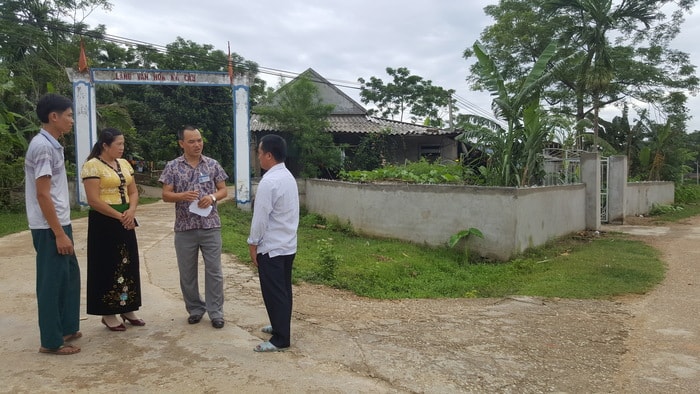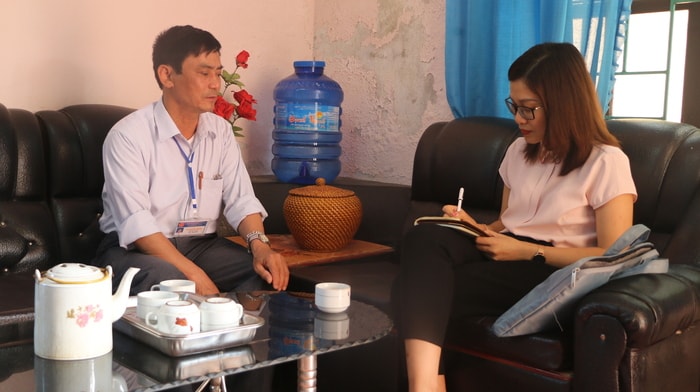Staff rotation according to Resolution 11-NQ/TW: Issues arising from practice
(Baonghean) - The implementation has confirmed that the rotation of leaders and managers is a correct policy of our Party. However, the practice also shows that there are still difficulties and obstacles that need to be resolved to continue to carry out this work well in the future.
» Creating short-term and long-term human resources according to Resolution 11-NQ/TW
» Cadre rotation according to Resolution 11-NQ/TW: Good cadres, good movement
Not yet free from localism and parochialism
During the process of approaching the grassroots, we noted some shortcomings and limitations in the work of rotating cadres. That is, the awareness of the grassroots Party committees is not really adequate, leading to some localities and units not wanting to receive rotated cadres but only wanting to develop local cadres. According to comrade Lang Van Xuan - Head of the Organization Committee of Quy Chau District Party Committee, "there is still a situation where some commune-level units in mountainous areas still have a strong family, clan, and local ideology, and are not interested in receiving rotated cadres because of the fear of "fighting for a share, blocking the place", fear of losing position and losing power".
 |
| The model of raising fish in cages on the lake bed in Dong Van commune (Que Phong) is applied by many households and brings in a good income. Photo: document |
Not to mention the situation of taking advantage of elections and votes of confidence to lower the prestige and isolate transferred cadres. Many transferred cadres are in a difficult position, because if they do not do their best, they will be evaluated by their superiors; if they do their best, they will have conflicts at the grassroots level; if they have low credibility, it will be difficult "to leave is bad, to stay is bad".
In addition, some places still confuse the rotation of cadres according to the plan for long-term training and development with the mobilization and arrangement of cadres according to the requirements and immediate tasks. Some localities, due to poor ideological work and not really smooth rotation procedures and methods, have led to the rotated cadres not complying with the rotation and mobilization work of the organization and being disciplined, such as the case of a head of a professional department of the People's Committee of Cua Lo town who did not comply with the decision of the Town Party Committee to transfer him to work as the ward party secretary for a long time, creating negative public opinion among the people, cadres and party members.
Rotated cadres violate discipline
Regarding the rotating cadres, in some positions there is a "position-holding" mentality; some young cadres in the planning have a mentality of liking stability, are afraid of difficulties and challenges in new positions; the mindset of choosing where to go and where to go. "Some cadres in the rotation category have not been trained in professional skills in areas of work such as socio-economic management, party building and lack practical experience, so they have not fully developed their abilities and capacities, the level of contribution to the grassroots is limited, in particular, there are comrades who are hesitant and worried when assigned tasks in remote areas" - Comrade Vi Hoe - Secretary of the Ky Son District Party Committee frankly expressed.
Besides, there are also cases where cadres transferred to the grassroots only try to fulfill their role, choose safe solutions, avoid conflicts for fear of losing votes or have the mentality of going to the grassroots as if going on a "messenger", waiting for the day to return, waiting to be promoted to a higher position; in some cases, when returning to the grassroots, the approach and selection of instructions are hasty and inappropriate, so they do not create a good effect.
The most regrettable thing is that some cadres committed mistakes when transferred, which became a "bloody" lesson in cadre work for some localities. For example, in Thanh Chuong district, two cadres committed mistakes in land management and financial management when transferred to the grassroots level, leading to one person being sentenced to suspended prison and the other to imprisonment.
According to comrade Dang Anh Dung - Standing Deputy Secretary of Thanh Chuong District Party Committee, the lesson learned from this unfortunate incident is that the Standing Committee and Standing Committee of the District Party Committee have put too much trust in the transferred cadres and the process of evaluating the transferred cadres has only focused on monitoring the movements of local movements, not closely checking and supervising the methods and ways of working of the transferred cadres, leading to violations and loss of cadres.
In Tan Ky district, there was also a case of a cadre transferred to the position of Deputy Secretary of the Party Committee and Chairman of the People's Committee of Tan Huong commune being disciplined with a reprimand due to violations in implementing the policy to support the summer-autumn drought. Before being promoted to the grassroots level, this cadre was the Deputy of the District Party Committee's Mass Mobilization Board. After being disciplined, the Tan Ky District Party Committee withdrew and arranged him to work as a specialist of the District Party Committee's Mass Mobilization Board. To stabilize the apparatus in Tan Huong, recently, the Standing Committee of the Tan Ky District Party Committee had to quickly transfer another cadre, formerly the Deputy of the District Internal Affairs Department, to work as Chairman of the Commune People's Committee... Tan Ky District Party Committee Secretary Bui Thanh Bao admitted that "this is an unfortunate incident and partly due to the fact that the inspection and supervision of transferred cadres has not been carried out smoothly".
Lack of "vacancy", lack of experience
Resolution 02-NQ/TU of Nghe An Provincial Party Committee on rotation and transfer of Party members, leaders and managers for the period 2016 - 2020 stipulates that those who want to join the Standing Committee of the District, City and Town Party Committees must go through the grassroots level. However, the difficulty that arises is that the time to implement the resolution is right after the Party Congresses at all levels for the term 2015 - 2020 and the election of the People's Council for the term 2016 - 2021, the grassroots political system in the communes has basically stabilized, and key positions have been filled. Therefore, there are almost no vacancies for cadres transferred from the district, while key cadres at the commune level have difficulty meeting the conditions for rotation and transfer to the district or to other localities.
According to comrade Bui Thanh Bao - Secretary of Tan Ky District Party Committee, "the problem is that the staffing at the commune level is rigid, so if there are no cadres reaching retirement age or violating discipline, it is very difficult to have vacancies to transfer district cadres to the grassroots level."
 |
| Comrade Pham Ngoc Nghia (2nd from right) - Secretary of Tien Phong Commune Party Committee talks with villagers. Photo: Document |
The Do Luong District Party Committee also pointed out a number of difficulties and obstacles in the work of rotating cadres. That is, firstly, the number of young, capable cadres who are the next generation of leaders and deputy leaders in departments, branches, sectors, and the district Fatherland Front who have just been promoted and appointed do not have enough experience and comprehensive leadership and direction methods, and have limited access to new jobs, so they are not bold enough to carry out rotation to the grassroots, especially in difficult and weak units.
Second, currently, localities are streamlining their payroll according to Resolution 39-NQ/TW and Decree 108/ND-CP associated with the job position project. The rotation of district officials to the grassroots level to take on key leadership positions while the locality has enough payroll will make it difficult to ensure the required streamlining rate.
On the other hand, on the district side, the rotation of department heads, or deputy department heads, boards, and organizations to the grassroots level will lead to a lack of people to perform professional tasks in some positions, while the apparatus of cadres and civil servants has been "framed" tightly and cannot be increased. Some leaders, managers, and specialists only perform specialized tasks during their work (for example, finance and planning, infrastructure economics, etc.). When they are rotated to other fields other than their training major, it will be difficult for them to meet the requirements of the assigned tasks.
Difficulty in "matching" rotation positions
Regarding the rotation of management leaders between communes and towns, it has not been implemented much in the past time. Because there are cases where people are eligible to be transferred to other units, but they cannot find suitable candidates to transfer again. Some cadres have held key leadership positions in communes and towns for 8-10 years, and due to great inertia, they need to be transferred to other units, but their working time is only less than 5 years. If they are transferred to professional civil servants, it is not suitable for their qualifications, while they have almost experienced other leadership positions. Besides, many localities have not dared to rotate key cadres at the commune level for fear of causing disruption to the apparatus at the grassroots level.
Restrictions on training standards
The transfer from the grassroots to the district level is also stuck due to the very high "necessary" conditions. Specifically, according to Regulation 57 of the Provincial Party Committee, to transfer to the district level, for the position of secretary or chairman, one must have a good university degree or higher; if the university degree is different, one must be a member of the district Party Committee. For civil servants, one must have worked for 5 years at the grassroots level, and be assessed as having completed the task excellently and suitable for the position to be recruited for 5 consecutive years, while the position and job at the district level cannot be increased.
Mr. Tran Doan Lam - Deputy Head of the Organization Committee of Tan Ky District Party Committee stated the reality, "some key leaders at the commune level are not properly trained, they study part-time at university and then standardize their degrees, so it is very difficult to transfer them up. In recent years, Tan Ky has only transferred one person from the commune level, comrade Phan Trung An - former Deputy Secretary of the Tan Ky Town Party Committee to be Deputy Head of the District Justice Department, then appointed as Head of the Department.
 |
| Comrade Nguyen Quang Minh - Chairman of the People's Committee of Dong Son Commune (Do Luong) discussed with reporters about the rotation of key officials at the commune level. Photo: QH |
In Quy Chau district, during the 2010-2015 term, there was only one commune-level cadre who was transferred to work at the district Farmers' Association. In Ky Son district, after many years, there was only one commune-level cadre who was selected to work at the district level, namely Nguyen Thi Dong - former Principal and Party Cell Secretary of Nam Can Kindergarten, to hold the position of Deputy Head of the District Party Committee's Mass Mobilization Committee.
According to comrade Truong Hong Phuc - Secretary of Do Luong District Party Committee: Although there has been determination, the rotation between the people - government - party blocs is posing difficulties related to professional qualifications and working capacity in some specialized and in-depth positions; especially the mentality of government officials who do not like to move to the people and party blocs.
Inadequate regime and policy
Many grassroots opinions reflect the inadequacies in the mechanism and policies that are also an obstacle to rotating cadres. Comrade Pham Trong Hoang - Secretary of the Tuong Duong District Party Committee said: The implementation of policies for rotating cadres has not had a common and unified regulation in the whole province, causing difficulties in supporting the stable life of rotating cadres, especially for cadres rotating to remote communes (no market, no official house, remote roads, etc.).
Another problem is that cadres in Party and mass organizations who are transferred to the grassroots level continue to receive the 55% allowance; but cadres in the State sector who are transferred to the grassroots level and hold the position of Party Secretary or Deputy Secretary are not entitled to this 55% allowance.
In addition, currently, although from the province to the grassroots, there is a policy: when rotated cadres are evaluated to have completed their tasks well, they will be assigned to positions equal to or higher than before the rotation. However, this has not been institutionalized by regulations, causing insecurity for rotated cadres... These have been and are issues that require synchronous and fundamental solutions to ensure that the rotation of cadres is practical and effective.
(To be continued)
PV Group
| RELATED NEWS |
|---|

